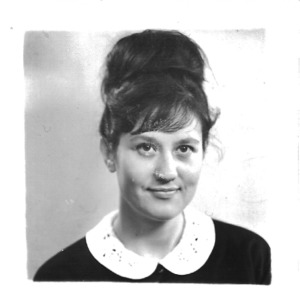Personal Details

|
||
| Name: | Danuta Stańczyk | |
| Maiden Name: | Misiewicz | |
| Nickname/Pseudonym: | ||
| Gender: | Female | |
| Date of birth: | 1941-11-23 | |
| Place of birth: | Poland, Wołyńskie, Kostopol, Niemilja, gmina Ludwipol | |
| Did this person die during World War ll?: | No | |
| Date of death: | ||
| Place of death: | ||
| Cause of Death: | ||
| Fathers given name: | Felicjan | |
| Entry ID: 146619 | Mothers given name: | Florentyna |
| Mothers maiden name: | Bronowicka | |
| Given name of spouse: | Wiesław | |
| Maiden name of spouse: | ||
| Given name(s) of children: | Paul | |
| Description: | Danuta came from a family of “Osadniks” (settlers/colonists), veterans of the Polish Army who had taken part in the Battle of Warsaw on 7 August 1920, and were given land in the Kresy to create the so-called ‘exemplary farms’, but had to repay the cost of the land to the state five years after the start of the programme in the spring of 1921. Her parents had a mill and a large farm, which they ran efficiently by working hard themselves and employing a few farmhands. Danuta was born during WW2 in 1941, after Poland had been invaded first by the Germans on 1 September 1939 and then by the Russians on 17 September 1939. Her family was living in constant uncertainty as the Russians were deporting thousands of Poles for forced labour to Siberia, followed by the Germans deporting thousands for forced labour to Germany and Nazi occupied Austria. Danuta lived in the village of Niemilja, Wołyń, with her parents and four older sisters Maria, Walentyna, Zofia and Alina. Around March/April 1943 rumours reached their village that militant Ukrainian nationalist extremists were attacking Polish villages and committing atrocities on Polish civilians, as well as on Ukrainians who would not collaborate with them or were married to Poles. Encouraged by both the Russians and the Germans, their intention was to cleanse Polish influence from the territory, which they historically considered to be Ukrainian. She was just over one year old when on 25 May 1943 her village was attacked by angry Ukrainian nationalists and their collaborators brandishing axes, pitchforks, kitchen knives and bayonets, and proceeded to indiscriminately carry out atrocities on victims regardless of their age or gender. Danuta’s father Felicjan and two older sisters, Maria and Zofia, were brutally murdered. Her mother Florentyna managed to escape into the woods with Danuta and her 7 year old sister Alina, and they miraculously survived the massacre. Her other sister Walentyna hid under a bridge in the river and therefore also survived. The massacre took place in close proximity to a German garrison in Bystrzyce without any reaction from the Germans, but soon afterwards they arrived and evacuated the few survivors to a makeshift camp. The Germans then carried out a segregation of the refugees with some being sent to concentrations camps and others being deported west for forced labour. Danuta and her family were deported with thousands of other Poles for forced labour by the Germans to Tyrol in Austria. Her eldest sister Walentyna at 15 years old became the main breadwinner and had to work in a paper factory, which involved carrying heavy rolls of paper. Whereas her mother, as well as having to take care of Danuta and her sister Alina, also had to work some days in a forest tree plants nursery. On the days that Florentyna had to work Walentyna would take care of the children, and would later have to make up the lost time at the factory. The family lived in a primitive wooden hut in the forest constantly suffering from the cold and shortage of food. Eventually Alina started attending a German school and, being an intelligent child, soon picked up the language. Her mother therefore sometimes sent her to the nearby farms to beg for food. The family was later transferred with other Poles to Germany, but the country was soon occupied by the Allies and so they were then transported by the Americans to Italy. Here Walentyna enlisted with the Polish Women’s Auxiliary Army Service (PWSK) and started working in the No. 3 Polish General Hospital in Palagiano tending to wounded soldiers. Danuta with her mother and sister Alina, now under Polish military protection, were housed in a DP Camp in Trani with other Polish refugees. Danuta started attending a nursery in the camp and Alina, being a few years older, went to a Polish school in Barletta, near Trani. Life took on some form of normality until 1946 when Danuta and her family were evacuated to the U.K. On 18 August 1946 they were housed in Foxley DP Camp, near Hereford, where they were allowed to stay until 21 November 1946. They were then put on a train without any money or food to join Walentyna, who was living in Iscoyd Park and working at the No.4 Polish Hospital. As Walentyna was not informed of their arrival, there was no one at the station to meet them. They sat at the station not knowing what to do, and as evening came they felt cold and hungry. Luckily, Florentyna heard a couple of Poles walking by and asked for their help. The family was taken to the main gate of the hospital, where they first had to go through security, and were then reunited with Walentyna. However, at first the hospital authorities were adamant that they could not stay there because this was a hospital of contagious diseases, but as the family was homeless they were allowed to stay until 26 November 1946, when arrangements were made for them to be housed in a Nissen hut in Tilstock Camp, Shropshire, alongside other Polish military families. Danuta soon started attending school first in Whitchurch and then in Prees, but had problems understanding English so her step-father Tytus Potocki arranged for her to go to a Polish Girls Boarding School in Pitsford, Northamptonshire, which was run by the Sisters of the Holy Family of Nazareth (The Holy Family Convent School). She attended this school from 1952-1958. In the meantime her sister Alina became a student at the Polish Girls Boarding School in Stowell Park, Gloucestershire; this was the ‘Ignacy Paderewski’ school which was transferred to the U.K. from Trani in Italy. Alina left school at 16 and started training as a nurse in a Shrewsbury hospital. She enjoyed her work while she was working on a children’s ward, but everything changed for the worse when she got transferred to a men’s ward and therefore left the profession. In 1954 Alina decided to move to Bradford in Yorkshire. In 1955 Danuta’s older sister Walentyna also moved to Bradford with her family. Danuta’s mother Florentyna and her step-father Tytus soon joined the family in Bradford. When Danuta finished school in 1958 she also settled in Bradford with the rest of the family, but then got a place at the London Polytechnic in Regent Street where she did a secretarial/commercial diploma course. After completing her course she got a job in London, and married Wiesław Stańczyk in 1963. A few years later their son Paul was born. |
Personal Situation at the outbreak of WWll
| Residence at the outbreak of WWll: | Poland, Wołyńskie, Kostopol, Niemilja, (near Bysztrzyce) |
| Kresy Inhabitant Status: | Civilian settler / Family member of civilian settler |
| Ethnicity: | Polish |
| Religion: | Roman Catholic |
| Education Level: | |
| Occupation at the outbreak of WWll: | |
| Military status at the outbreak of WWll: | |
| Military Rank at the outbreak of WWll: |
Deportations and Repressions
| Other Information: |
For those who were repatriated to Poland from the Kresy or the USSR, please provide the following information
| Date of return to Poland: | // |
| Province: | |
| County: | |
| Locality: | |
| Nearest large city: |
For those who stayed in the Kresy area during WWII, please provide the following information
| Province - as at 1939: | |
| County: | |
| City / Place: | |
| Nearest Large City: |
| Other Military Service: | |
| Participation in WWII battles: | |
| Medals received: | |
| Other Battles: |
Other Wartime Circumstances
| Rodzaj okoliczności | Dzień | Miesiąc | OD roku | Dzień | Miesiąc | Rok DO | Dodatkowe informacje |
|---|---|---|---|---|---|---|---|
| German forced labourer | 1943 | 1945 | Danuta and her family were deported to Tyrol in Austria and later to Germany. She was too young to work as she was only 2 years old, but her mother Florentyna and older sister Walentyna became slave labourers. |
Other Wartime Circumstances
| Other Information: | In Austria the family was housed in a primitive wooden hut near Dorf Fellbach, between Linz and Spital, and Walentyna had to work in a paper factory carrying heavy rolls of paper whilst Florentyna had to work in a forest tree plants nursery. |
| Orphanages: | |
| Civilian Camp in the Middle East: | |
| Civilian Camp in India: | |
| Civilian Camp in Africa: | |
| Please provide information if none of the preceding apply: |
Residence After 1945
| Kraj | Stan | Dzielnica | Miejscowość | Najbliższe duże miasto | Opis |
|---|---|---|---|---|---|
| Italy | Puglia | Taranto | Trani | From Germany Danuta and her family were transported with other Polish refugees by the Americans to Italy, where Walentyna enlisted with the Polish Womens Auxiliary Army Service (PWSK) in Palagiano, and Danuta with her mother and sister Alina were housed in a DP camp in Trani. | |
| United Kingdom | Hereford | Foxley | On 18 August 1946 Danuta was evacuated with her mother and sister Alina from Italy to the U.K. and housed in Foxley Displaced Persons Camp, near Hereford. Then on 21 November 1946 they were moved to Iscoyd Park to be reunited with Walentyna, who was working at the Polish No.4 Hospital, and they were finally housed in a Nissen hut in Tilstock Camp, Shropshire. In the 1950s the family moved to Bradford in Yorkshire, but after attending the London Polytechnic in Regent Street, Danuta married Wiesław Stańczyk in 1963 and settled in London. |


